- Home
- STEVE MARTIN
An Object of Beauty: A Novel
An Object of Beauty: A Novel Read online
AN OBJECT OF
BEAUTY
A Novel
STEVE MARTIN
NEW YORK BOSTON
Begin Reading
Table of Contents
Copyright Page
Table of Contents
Front Cover Image
Welcome
Part I
Chapter 1
Chapter 2
Chapter 3
Chapter 4
Chapter 5
Chapter 6
Chapter 7
Chapter 8
Chapter 9
Chapter 10
Chapter 11
Chapter 12
Chapter 13
Chapter 14
Part II
Chapter 15
Chapter 16
Chapter 17
Chapter 18
Chapter 19
Chapter 20
Chapter 21
Chapter 22
Chapter 23
Chapter 24
Chapter 25
Chapter 26
Chapter 27
Chapter 28
Chapter 29
Chapter 30
Chapter 31
Chapter 32
Chapter 33
Chapter 34
Chapter 35
Chapter 36
Chapter 37
Chapter 38
Chapter 39
Chapter 40
Chapter 41
Chapter 42
Chapter 43
Chapter 44
Chapter 45
Chapter 46
Part III
Chapter 47
Chapter 48
Chapter 49
Chapter 50
Chapter 51
Chapter 52
Chapter 53
Chapter 54
Chapter 55
Chapter 56
Chapter 57
Chapter 58
Chapter 59
Chapter 60
Chapter 61
Chapter 62
Chapter 63
Chapter 64
Chapter 65
Chapter 66
Chapter 67
Chapter 68
Photo Credits and Copyrights
Also by Steve Martin
Copyright
PHOTO CREDITS AND
COPYRIGHTS
La Mondaine, by James Tissot. Photo: Snark/Art Resource, NY.
Daybreak, by Maxfield Parrish: Copyright © Maxfield Parrish. Licensed by ASaP Worldwide and VAGA, New York, NY. Photo: Christie’s Images/The Bridgeman Art Library.
Nude Bathers, by Milton Avery: Copyright © 2010 Milton Avery Trust /Artists Rights Society (ARS), New York. Photo: Bethany Rouslin.
Mug, Pipe and Book, by John Frederick Peto. Photo: SuperStock.
Herald, by William Michael Harnett. Photo: SuperStock.
Watson and the Shark, by John Singleton Copley. Image courtesy National Gallery of Art, Washington.
Woman I, by Willem de Kooning: Copyright © 2010 The Willem de Kooning Foundation/Artists Rights Society (ARS), New York. Photo: Copyright © The Museum of Modern Art/Licensed by SCALA/Art Resource, NY.
Los Angeles County Museum on Fire, by Ed Ruscha: Copyright © Ed Ruscha. Courtesy Gagosian Gallery, New York.
November in Greenland, by Rockwell Kent appears courtesy of the Plattsburgh State Art Museum, State University of New York, Rockwell Kent Collection. Bequest of Sally Kent Gorton. Photo: Pushkin Museum, Moscow, Russia/The Bridgeman Art Library International.
The Bay of Naples by Moonlight, by Ivan Aivazovsky: Copyright © Anatoly Sapronenkov/SuperStock.
Still Life with Wine Bottles, by Giorgio Morandi: Copyright © 2010 Artists Rights Society (ARS), New York/SIAE, Rome. Photo: Gagosian Gallery.
Flowers, by Andy Warhol: Copyright © 2010 The Andy Warhol Foundation for the Visual Arts, Inc./Artists Rights Society (ARS), New York. Photo: The Andy Warhol Foundation, Inc./Art.
Untitled, by Tom Friedman. Art and photo are copyright © Tom Friedman. Courtesy Gagosian Gallery.
El Jaleo, by John Singer Sargent: Copyright © Isabella Stewart Gardner Museum, Boston, MA, USA/The Bridgeman Art Library International.
Woman with Pears, by Pablo Picasso: Copyright © 2010 Estate of Pablo Picasso/Artists Rights Society (ARS), New York. Photo: Copyright © The Museum of Modern Art/Licensed by SCALA/Art Resource, NY.
Marilyn, by Andy Warhol: Copyright © 2010 The Andy Warhol Foundation for the Visual Arts, Inc./Artists Rights Society (ARS), New York. Photo: The Andy Warhol Foundation, Inc./Art Resource, NY.
Three Parts of an X, by Robert Gober. Art and photo are copyright © Robert Gober. Courtesy Matthew Marks Gallery, New York.
Initiation, by Wilfredo Lam: Copyright © 2010 Artists Rights Society (ARS), New York/ADAGP, Paris. Photo: CNAC/MNAM/ Dist. Réunion des Musées Nationaux/Art Resource, NY.
La Nona Ora, by Maurizio Cattelan. Courtesy of the artist and Marian Goodman Gallery, New York.
Betwixt the Torus and the Sphere, by Richard Serra: Copyright © 2010 Richard Serra/Artists Rights Society (ARS), New York. Photo: Copyright © Richard Serra. Courtesy Gagosian Gallery. Photo by Robert Mckeever.
Felt Suit, by Joseph Beuys: Copyright © 2010 Artists Rights Society (ARS), New York/VG Bild-Kunst, Bonn. Photo: Tate, London/Art Resource, NY.
Eine Kleine Nachtmusik, by Dorothea Tanning: Copyright © 2010 Artists Rights Society (ARS), New York/ADAGP. Photo: Tate, London/Art Resource, NY.
All photos of artwork are used by permission.
PART
I
1.
I AM TIRED, so very tired of thinking about Lacey Yeager, yet I worry that unless I write her story down, and see it bound and tidy on my bookshelf, I will be unable to ever write about anything else.
My last name is Franks. Once, in college, Lacey grabbed my wallet and read my driver’s license aloud, discovering that my forenames are Daniel Chester French, after the sculptor who created the Abraham Lincoln memorial. I am from Stockbridge, Massachusetts, where Daniel Chester French lived and worked, and my parents, being parochial Americans, didn’t realize that the name Daniel Chester French Franks read funny. Lacey told me she was related to the arts by blood, too, but declined to tell me the full story, saying, “Too long. Later I’ll tell you, French Fries.” We were twenty.
I left Stockbridge, a town set under the glow of its even more famous citizen, the painter of glad America, Norman Rockwell. It is a town that is comfortable with art, although uncomplicated art, not the kind that is taught in educational institutions after high school. My goal, once I discovered that my artistic aspirations were not accompanied by artistic talent, was to learn to write about art with effortless clarity. This is not as easy as it sounds: whenever I attempted it, I found myself in a convoluted rhetorical tangle from which there was no exit.
After high school, I went south to Davidson College in North Carolina, while Lacey drove north from Atlanta, and there, Lacey and I studied art history and had sex together exactly once.
Even at the age of twenty, Lacey’s entry into the classroom had the pizzazz of a Broadway star. Our eyes followed her down the aisle, where she would settle into her seat with a practiced hair-flip. When she left a room, there was a moment of deflation while we all returned to normal life. It was apparent to everyone that Lacey was headed somewhere, though her path often left blood in the water.
If one of her girlfriends was in a crisis, Lacey would rush in, offering tidal waves of concern. She could soothe or incite in the name of support: “Honey, get over it,” or, conversely, “Honey, get even.” Either bit of advice was inspiring. The emotions of men, however, were of a different order. They were pesky an
noyances, small dust devils at her feet. Her knack for causing heartbreak was innate, but her vitality often made people forgive her romantic misdeeds. Now, however, she is nearing forty and not so easily forgiven as when her skin bloomed like roses.
I slept with her in our second year. I was on the rebound and managed to avoid devastation by reconnecting with my girlfriend days—or was it hours—later, and Lacey’s tentacles never had time to attach. But her sense of fun enchanted me, and once I had sufficiently armored myself against her allure by viewing her as a science project, I was able to enjoy the best parts of her without becoming ensnared.
I will tell you her story from my own recollections, from conversations I conducted with those around her, and, alas, from gossip: thank God the page is not a courtroom. If you occasionally wonder how I know about some of the events I describe in this book, I don’t. I have found that—just as in real life—imagination sometimes has to stand in for experience.
2.
LACEY’S LIFE AND MINE have paralleled each other for a long while. When we were twenty-three, our interest in art as a profession landed us both in New York City at a time when the art world was building offshore like a developing hurricane. Our periodic lunches caught me up with her exploits. Sometimes she showed up at a Manhattan café with a new boyfriend who was required to tolerate my unexplained presence, and when she excused herself to the restroom, the boyfriend and I would struggle for conversation while he tried to discover if I was an ex-lover, as he soon would be.
In August 1993, she showed up at one of these lunches in a summer dress so transparent that when she passed between me and a bay window hot with sunlight, the dress seemed to incinerate like flash paper. Her hair was clipped back with a polka-dot plastic barrette, which knocked about five years off her age.
“Ask me where I was,” she said.
“And if I don’t?”
She made a small fist and held it near my face. “Then socko.”
“Okay,” I said. “Where were you?”
“At the Guggenheim. A furniture show.”
The Guggenheim Museum is Frank Lloyd Wright’s questionable masterpiece that corkscrews into Fifth Avenue. Questionable because it forces every viewer to stand at a slant.
“ ‘The Italian Metamorphosis,’ ” I said. “I wrote about it. Too late to get into a magazine. What did you think?”
“I’d rather fuck an Italian than sit on his furniture,” she said.
“You didn’t like it?”
“I guess I was unclear. No.”
“How come?”
“Taste?” she said, then added, “Only one thing could have made it better.”
“What’s that?”
“Roller skates.”
Lacey talked on, oblivious to the salivations that her dress was causing. She had to know of its effect, but it was as though she’d put it on in the morning, calculated what it would do, then forgot about it as it cast its spell. Her eyes and attention never strayed from me, which was part of her style.
Lacey made men feel that she was interested only in that special, unique conflation of DNA that was you, and that at any moment she was, just because you were so fascinating, going to sleep with you. She would even take time to let one of your jokes sweep over her, as though she needed a moment to absorb its brilliance, then laugh with her face falling forward and give you a look of quizzical admiration, as if to say, “You are much more complicated and interesting than I ever supposed.”
“Come with me,” she said after coffee.
“Where to?”
“I’m buying a dress. I’m interviewing at Sotheby’s tomorrow and I have to look like a class act.”
The New York heat baked us till we found the inside of a moderately cooler downtown dress shop that featured recycled class-act clothing. Music blared as Lacey zeroed in on a dark blue tight skirt and matching jacket. She winced at the price, but it did not deter her. She pulled the curtain of the changing room, and I could hear the rustle of clothes. I pictured the skirt being pulled on and zipped up. She emerged wearing the jacket loosely opened, with nothing on underneath—which created a sideways cleavage—and started buttoning it up in front of the mirror, surveying herself. “I’ve got a blouse at home I can wear with this,” she muttered to me. She straightened up and pulled the barrette from her hair, causing the blond mix of yellows and browns to fall to her shoulders, and she instantly matured.
“They’re going to love you,” I said.
“They goddamn better because I’m broke. I’m down to seven thousand.”
“Last week you said you had three thousand.”
“Well, if I’ve got three, I’m fucked. So let’s call it seven.”
Lacey turned from the mirror for the first time and struck a pose in the preowned Donna Karan.
“You look great. A lot of people our age don’t know how to go in and apply for a job,” I said.
Lacey stared at me and said, “I don’t go in and apply for a job. I go in and get a job.”
And so Lacey joined the spice rack of girls at Sotheby’s.
Sotheby’s and Christie’s, the two premier auction houses in New York, drew young, crisp talent from Harvard and its look-alikes. Majors in art history were welcomed over majors in art making, and pretty was preferred in either sex. The houses wanted the staff to look swell as they crisscrossed the busy galleries on exhibition days, holding in their arms files, faxes, and transparencies. Because the pay was low, the young staff was generally financed from home. Parents thought well of it because their children were at respectable firms, working in a glamorous business, with money of all nations charging the atmosphere. The auction houses seemed not as dull as their financial counterparts on Wall Street, where parents of daughters imagined glass ceilings and bottom patting. Sotheby’s was an institution that implied European accents and grand thoughts about art and aesthetics coexisting with old and new money in sharp suits and silk ties. This was a fresh and clean New York, where you dressed nicely every day and worked in a soaring, smoke-free, drugless architectural building filled with busts, bronzes, and billionaires. What the parents forgot about were the weekends and evenings when their children left the Cézannes and Matisses and crept underground, traveling back to shared downtown spaces where they did exactly the same things they would have done if they had joined a rock band.
Lacey’s first assignment was in the bins, cataloging and measuring nineteenth-century pictures in a dim basement that was largely unpopulated. Her Donna Karan was wasted on the shippers and craters, but she kept her wardrobe keen for her occasional pop-ups to the fourth-floor offices. An ivy-embraced college may have been her education in the high ground of art, but Sotheby’s basement was her education in the fundamentals. She hoisted pictures onto a carpet-covered table, stretched her tape measure over their backs, and wrote down everything she could. She flipped them over and noted signatures and monograms, trying to decipher artists’ illegible scrawls, and she scratched around in the cumbersome reference dictionaries, Myers and Benezit, to find listings of obscure artists so she could report a successful attribution to her superiors. During her first year, she saw the fronts and backs of thousands of paintings. She learned to precisely tap a painting with the back of her finger: a hard, stiff canvas indicated the picture had been relined, usually a warning sign about a painting’s poor condition. She was taught to identify varnished prints that were trying to pass themselves off as paintings—a magnifying glass would reveal printer’s dots (to the disappointment of excited sellers who believed they owned an original). She learned to distinguish etchings from lithographs by raking the print in a hard light, looking for telling shadows in the groove of the etched line.
The paintings in the basement were generally dogs; the finer works remained upstairs, hung over a director’s desk or in a private room until their grand display in one of the large galleries. The masterpieces were examined by conservators bearing loupes and black lights, while Lacey toiled downstairs in
the antique dust like Sneezy the Dwarf. The subject matter she faced every day was not the apples of Cézanne, but the kitsch of the nineteenth century: monks tippling, waifs selling flowers, cardinals laughing, cows in landscapes, Venetian gondoliers, baby chicks in farmyards, mischievous shoeshine boys, and still lifes painted so badly that objects seemed to levitate over the tabletop on which they were supposed to be gravitationally attached. On her rare visits upstairs, she found serenity in the sight of the occasional Seurat or Monet and, sometimes, Rembrandt. However, through the drudgery downstairs, Lacey was developing an instinct that would burrow inside her and stay forever: a capacity to know a good painting from a bad one.
Her walk-on role at Sotheby’s stood in contrast with her starring role in the East Village bars and cafés. After her practiced and perfected subway ride home, which was timed like a ballet—her foot forward, the subway car doors opening just in time to catch her—she knew the bar lights were coming on, voices were raised, music edging out onto the sidewalks. She felt like the one bright light, the spotlit girl scattering fairy dust, as she walked the few blocks to her walk-up. Once inside, she slumped sideways on her bed, cocked the phone against her head, and sipped Scotch while she phoned Angela or Sharon, or sometimes, me.

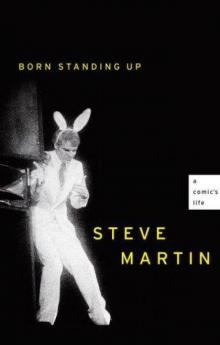 Born Standing Up: A Comic's Life
Born Standing Up: A Comic's Life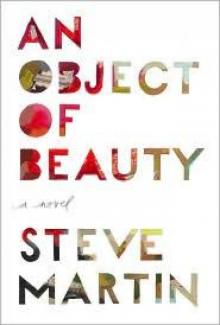 An Object of Beauty
An Object of Beauty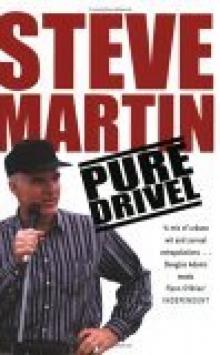 Pure Drivel
Pure Drivel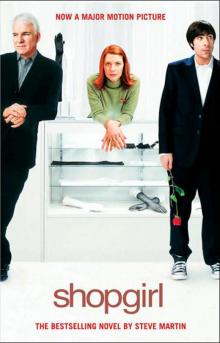 Shopgirl
Shopgirl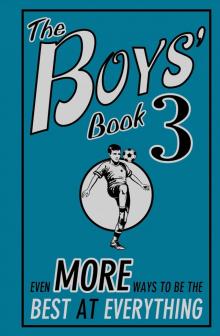 The Boys' Book 3
The Boys' Book 3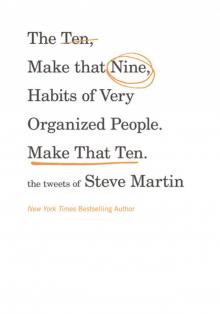 The Ten, Make That Nine, Habits of Very Organized People. Make That Ten.: The Tweets of Steve Martin
The Ten, Make That Nine, Habits of Very Organized People. Make That Ten.: The Tweets of Steve Martin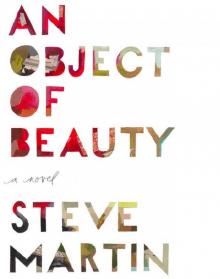 An Object of Beauty: A Novel
An Object of Beauty: A Novel